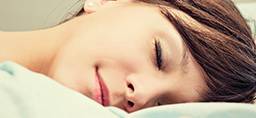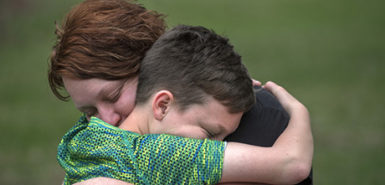
Don’t try calling 16-year-old Emily DeVries at midnight.
Chances are the Holland Christian High School junior is awake. But she has turned off her phone and all other electronics in her efforts to fall asleep.
Sometimes she even counts sheep. It doesn’t always work.
Emily is not alone. According to the National Sleep Foundation, 85 percent of teens get less than eight hours of sleep each night.
Emily’s sleep shortage is linked to incapacitating migraine headaches that leave her dizzy and nauseous, wreaking havoc with her schoolwork and personal life. After CT scans and MRIs ruled out other causes, her neurologist identified sleep deprivation as a possible culprit.
“We really didn’t think about sleep issues until we were digging into the cause of the migraines and vertigo,” said Emily’s Mom, Lisa DeVries. “Emily’s never been a pop-out-of-bed person, but that’s not surprising because I’m not a morning person, either.”
To tackle her sleeplessness, Emily’s been getting help from a Spectrum Health Sleep Disorders Centers.
“After my first sleep study, they told me I had sleep apnea—I stopped breathing four or five times every hour,” Emily said.
Subsequent surgery to remove her enlarged tonsils and adenoids helped, but didn’t completely resolve the issue.
During her next sleep study, Emily still stopped breathing a couple of times per hour. Now she uses a CPAP machine to regulate her breathing. The equipment has been adjusted a couple of times, and she’ll have a followup appointment at the end of the summer.
In the meantime, she’s still working on another issue: Insomnia.
“I try to be in bed at 10:30 or 10:45, but typically it takes two hours or longer to fall asleep,” Emily said. “Because it’s summer, I can sleep in until 11 the next morning. But when I need to get up at 6:45 for school, it’s a problem.”
A study published by the University of Michigan proves what many parents and teachers have suspected all along: Sleep in adolescence has been in steady and significant decline for the past 20 years.
Less sleep leads to issues in concentration, poor student performance, difficulty solving problems, skin problems such as acne, and safety issues such as driving drowsy. Lack of sleep can also lead to issues such as inappropriate or aggressive behavior.
Emily and her mom have seen the effects firsthand, especially when stress is added to the mix.
“When I’m short on sleep, I tend to be short-tempered and get frustrated easily,” Emily admitted. “A big project at school turns into a big cycle of, ‘Oh my gosh, I didn’t sleep well, so I can’t concentrate,’ and then I’m even more stressed so I can’t fall asleep the next night.”
For relaxation and fun, Emily thrives on year-round participation with her school’s Robotics Team, which she says is “stressful, but a good kind of stress.” Eventually she looks forward to attending an out-of-state college and a potential writing career. But first, Emily knows she needs to overcome her issues using a trial-and-error approach.
“We’ve learned that conquering a sleep problem is more of an art than science,” Lisa said. “It’s frustrating because you want to help your child be healthy and strong and it’s hard when they’re not. We’re looking at this as a journey. Each step we take gets us down the pathway to getting Emily well.”
John Schuen, MD, an expert in pediatric sleep medicine and division chief for pulmonology at Spectrum Health Helen DeVos Children’s Hospital, has some advice for Emily and other teens who struggle with sleep. (Note: These are useful for just about anyone with sleep issues.)
- Make sure the bedroom is dark. Try to block out as much light as possible.
- Get teens involved in vigorous physical activity during the day.
- Avoid going to sleep with the TV or radio on. Consider a fan or a soothing sounds CD or app.
- Avoid alcohol, cigarettes, caffeinated drinks and heavy meals in the evening. Alcohol, cigarettes and caffeine can disrupt sleep and eating big and/or spicy meals can cause discomfort or indigestion. (It goes without saying that alcohol and smoking are illegal and hazardous for teens and young adults at any time of day.)
- Avoid video games or screen time on electronics one hour prior to bedtime.
- Wind down. Encourage your teens to spend an hour before bed doing a calming activity such as reading a book.
- Keep a regular bedtime. Have your teens try to keep weekday and weekend bedtimes within one hour of the other.
- Consider melatonin one hour prior to bedtime to assist with sleep.
 /a>
/a>
 /a>
/a>
 /a>
/a>